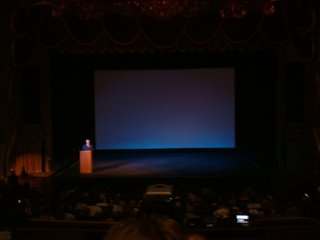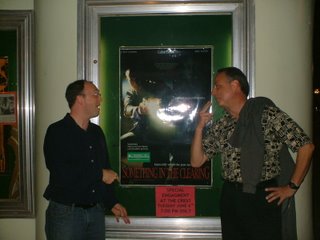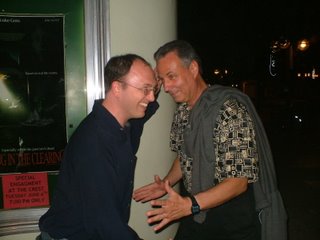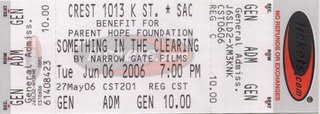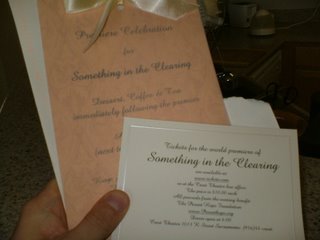Occasionally, I find I'm not alone about grammar and spelling. Check out this article I found through Digg.com (and currently rated at over 1800 diggs, too):
10 flagrant grammar mistakes that make you look stupid
Jody Gilbert
TechRepublic
June 06, 2006, 16:00 BST
If you want to craft an error-free message that reflects your professionalism, be on the lookout for these common grammatical slip-ups
These days, we tend to communicate via the keyboard as much as we do verbally. Often, we're in a hurry, quickly dashing off emails with typos, grammatical shortcuts (I'm being kind here), and that breezy, e.e. cummings, no-caps look. It's expected. It's no big deal. But other times, we try to invest a little care, avoiding mistakes so that there's no confusion about what we're saying and so that we look professional and reasonably bright.
In general, we can slip up in a verbal conversation and get away with it. A colleague may be thinking, "Did she just say 'irregardless'?", but the words flow on, and our worst transgressions are carried away and with luck, forgotten.
That's not the case with written communications. When we commit a grammatical crime in emails, discussion posts, reports, memos, and other professional documents, there's no going back. We've just officially gone on record as being careless or clueless. And here's the worst thing. It's not necessary to be an editor or a language whiz or a spelling bee triathlete to spot such mistakes. They have a way of doing a little wiggle dance on the screen and then reaching out to grab the reader by the throat.
So here we are in the era of Word's red-underline "wrong spelling, dumb ass" feature and Outlook's Always Check Spelling Before Sending option, and still the mistakes proliferate. Catching typos is easy (although not everyone does it). It's the other stuff — correctly spelled but incorrectly wielded — that sneaks through and makes us look stupid. Here's a quick review of some of the big ones.
#1: Loose for lose
No: I always loose the product key.
Yes: I always lose the product key.
#2: It's for its (or god forbid, its')
No: Download the HTA, along with it's readme file.
Yes: Download the HTA, along with its readme file.
No: The laptop is overheating and its making that funny noise again.
Yes: The laptop is overheating and it's making that funny noise again.
#3: They're for their for there
No: The managers are in they're weekly planning meeting.
Yes: The managers are in their weekly planning meeting.
No: The techs have to check there cell phones at the door, and their not happy about it.
Yes: The techs have to check their cell phones at the door, and they're not happy about it.
#4: i.e. for e.g.
No: Use an anti-spyware program (i.e., Ad-Aware).
Yes: Use an anti-spyware program (e.g., Ad-Aware).
Note: The term i.e. means "that is"; e.g. means "for example". And a comma follows both of them.
#5: Effect for affect
No: The outage shouldn't effect any users during work hours.
Yes: The outage shouldn't affect any users during work hours.
Yes: The outage shouldn't have any effect on users.
Yes: We will effect several changes during the downtime.
Note: Impact is not a verb. Purists, at least, beg you to use affect instead:
No: The outage shouldn't impact any users during work hours.
Yes: The outage shouldn't affect any users during work hours.
Yes: The outage should have no impact on users during work hours.
#6: You're for your
No: Remember to defrag you're machine on a regular basis.
Yes: Remember to defrag your machine on a regular basis.
No: Your right about the changes.
Yes: You're right about the changes.
#7: Different than for different from
No: This setup is different than the one at the main office.
Yes: This setup is different from the one at the main office.
Yes: This setup is better than the one at the main office.
#8 Lay for lie
No: I got dizzy and had to lay down.
Yes: I got dizzy and had to lie down.
Yes: Just lay those books over there.
#9: Then for than
No: The accounting department had more problems then we did.
Yes: The accounting department had more problems than we did.
Note: Here's a sub-peeve. When a sentence construction begins with If, you don't need a then. Then is implicit, so it's superfluous and wordy:
No: If you can't get Windows to boot, then you'll need to call Ted.
Yes: If you can't get Windows to boot, you'll need to call Ted.
#10: Could of, would of for could have, would have
No: I could of installed that app by mistake.
Yes: I could have installed that app by mistake.
No: I would of sent you a meeting notice, but you were out of town.
Yes: I would have sent you a meeting notice, but you were out of town.
Okay, now I'm going to do something slightly unorthodox. I'm pasting an email I received some time ago, printed verbatim, paragraph returns and all. It's a response to a job ad I posted on Craigslist; bear in mind,
this person was responding to me, their* potential employer. (Please know that my intent here is not to be vindictive, but to illustrate how poor grammar can paint an devastatingly unflattering portrait. I'm reprinting this to learn from, not to make fun of.)
Boldface represents all their
* errors, and my comments are in
[ghosted brackets]. (All names have been changed, etc.):
To whom this may concern,
I hope your still looking for help. I have included a resume and cover letter, [conjunction missing] I believe I'm a great asset to cosider as I do have the ability to multi-task and. [What's this period doing here? Or maybe the "and" was a mistake?]
I am a makeup and fx artisit (forte horror / thriller) but I can do anything needed, with ease., [Why is that period there?] as well I do production crew,1st [missing space after comma] AD, and Art Department.
I have been freelance / contract employed in both media and film positions, [conjunction missing] I think I can be helpful with alot ["a lot" is two words] of the connections and knowledge in various areas of the media and entertainment industry.
If you'd like to talk I could meet you, we may find we can help eachother ["each other" is two words] very well.
Thank you for your time.
I hope to hear from you soon.
You all probably know how I feel about
mislaid apostrophes and spelling errors. Thus, as you can imagine, this was an excruciatingly painful email to read.
Is the English language difficult to master? You bet. Do I get it wrong myself?
Constantly.Nevertheless, when you respond to a Craigslist job ad, what you write—and how you write it, i.e., with or without errors—is the first and often only thing your future employer has to get a first impression of you.
So why aren't some people, at the barest minimum, running their missives through a spell check? Twenty years ago, I might have overlooked this brouhaha. Now, with so many superb online
dictionaries and
spell checkers available, there is really no excuse anymore to have spelling mistakes.
Door #2: Waste your time sending out resumes wondering why nobody calls you in for an interview.
I am a writer... so I'm too aware of how I hold myself to a higher grammatical standard than I should expect from everyone else, but I still feel it's reasonable to occasionally harp about such major blunders found in this email because getting grammar and spelling right is primarily about forming good habits that pay off later.
Why, for instance, do we always buckle our seat belts if we're only driving a half mile? Because it's a good habit we try to establish so that when we do get into an accident, we escape unharmed. Forcing yourself to use good grammar and proper spelling is like training yourself to wear a seat belt—when the accident comes, will you be prepared, or are you aiming for the windshield? One need only remember how fuzzy spelling jettisoned Dan Quale into a world of pain.
Good grammar and spelling is also like keeping a reasonable appearance with your clothes. Using bad grammar is like saying, "why should I care what you think about the way I dress? I'm not naked, am I?" You wouldn't go to a job interview with your mascara put on badly, right? You wouldn't meet a potential boss dressed in a tank top or with your fly down, would you? Right before you present yourself, you'd at least brush your hair or make sure you didn't have any bleeding shaving cuts or coffee stains on your tie, right?
It's worth mentioning here that I do have a dyslexic friend and am extremely sympathetic to those with dyslexia, so I constantly overlook my dyslexic friend's frequent grammar and spelling errors. Still, even dyslexics can use a grammar and spell check nowadays. To my understanding, poor
grammar is not a symptom of dyslexia, only poor spelling. Can someone please reach out and tag me if I'm wrong about this?
There is a time and place, however, for drawing a line in the sand and
not drawing a line in the sand. Though I often wince, I choose to overlook simple mistakes in emails and IMs because who really cares? It's not a printed book. Nor are honey-do lists or post-it reminders. An email to a potential employer... well, that's almost like a printed book, in my eyes.
The problem with overlooking simple mistakes in common discourse is that it's a slippery slope: if it gradually becomes acceptable to use
"it's" instead of "its", then it should become acceptable to use a double negative, too, because after half of all English speakers are speaking with an improper usage, it
becomes a "proper" usage. And then, 100 years from now, we'll all be speaking a mish-mash of English filled with incorrect grammar. (Not that grammar is intrinsically correct—it's not—but we all agreed on certain rules, so why can't we live by them? Is it really so hard?)
Here is an excerpt from an email I wrote my friend Hans about when to get my panties in a twist about grammar and spelling:
A THEORY ABOUT THINKING AND EXPRESSION
If I publish a book, I've put in a considerable amount of thought about it, getting it written and edited, refuted and corrected, checked and double-checked (in an ideal world). When the book is finally published, after numerous revisions—with countless eyes reviewing each step—that book is the finest and most accurate expression of my thoughts. It's in print. It will last. Making any grammatical or spelling mistakes here is really unforgivable.
One step removed might be a planned essay or a letter to a friend. This doesn't have as many people checking your ideas all the way through to their logical conclusion, so your thinking might not be as accurate or as insightful as a published book. Grammar & spelling mistakes here are tolerable, but frowned upon.
One step before that might be an email written in relative haste—not contemplated with the same amount of time as an essay, thereby inferring even less insight and accuracy. Though still technically the written word, incorrect spelling here should garner some playful jabbing, but nothing too harsh.
Finally—the first step in the process—would be the spoken word, which has a wide range of usage, from speeches in political forums to bar talk. However, according to the logic of this argument, the ephemeral nature of the spoken word does not always dictate we get things grammatically correct 100% of the time, even if we do spend our prep school years getting proper grammar drilled into us.
[There are other variations I have not addressed above, like instant messaging and the like, but you get the drift.]
Anyone who wants to brush up on their
* grammar should read the immensely entertaining
Eats, Shoots & Leaves: The Zero Tolerance Approach to Punctuation by Lynne Truss. Great book. Honest.
Post Scriptum: Just to show you all I sometimes live in a glass house, you'll be happy to know that I ran this post through a spell check and discovered I had misspelled "correctable", "dyslexics", "grammar", "slippery" and "misspelled". I misspelled "misspelled". Wow. Time to me to shut my trap, huh?* Update 8/20/08: nibiyabi rightfully called me out on using "their" instead of his or her. I could correct the errors in this post, but it seems fitting to show the world even my own imperfections.
 There's a scene halfway through where Talia Shire's character and her character's husband are staying in the woods in a log cabin. They're being lovey-dovey when this animal makes a weird sound outside the cabin. At first, they ignore it. Then the husband gets up to see what it is.
There's a scene halfway through where Talia Shire's character and her character's husband are staying in the woods in a log cabin. They're being lovey-dovey when this animal makes a weird sound outside the cabin. At first, they ignore it. Then the husband gets up to see what it is. 



